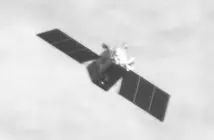
Written by staff writer.
The UK’s Competition and Markets Authority (CMA) has provisionally approved the AUD5.85 billion merger of Viasat and Inmarsat. The two entities have satellite constellations providing internet connectivity for multiple industries, including fixed broadband, government, maritime, offshore energy, commercial and business aviation.
The provisional approval follows an in-depth phase 2 inquiry after earlier identifying competition concerns during the initial investigation. There were substantial concerns that the merger could significantly lessen competition for UK airline customers, particularly involving satellite connections for onboard WiFi.
California-based Viasat announced in Q4 2021, that it would acquire UK-based Inmarsat in a cash and stock deal that remained subject to approval by competition authorities in multiple jurisdictions. Inmarsat said the merger would create a “leading global communications innovator with enhanced scale and scope to affordably, securely, and reliably connect the world.” The merger will combine the spectrum, satellite, and terrestrial assets of both entities, which they say will create higher speeds, more bandwidth, greater bandwidth density at high-demand locations, and lower latency at a lower cost than either Viasat or Inmarsat could provide on their own.
After completing the phase 2 investigation, the CMA said on March 1 that while Inmarsat and Viasat compete closely in the aviation sector, the merger would not substantially lessen competition because of the fast-growing nature of the satellite industry and the number of new entrants in it.
“Following its in-depth Phase II investigation opened last October, the UK Competition and Markets Authority has concluded that Viasat’s proposed acquisition of Inmarsat will not substantially lessen competition,” reads an Inmarsat statement. “This is an important milestone in the regulatory process that acknowledges the strong evidence of the highly competitive nature of the global market for satellite communications which includes numerous providers, including well-established companies and well-funded new entrants.”
The evolving nature of the satellite industry was critical in swinging the CMA’s decision in favour of the merger. The agency said the number of new entrants, including SpaceX’s Starlink constellation, OneWeb, Amazon, TeleSat, SES and Eutalsat, either already in or about the enter the satellite industry meant established entities such as Viasat and Inmarsat needed to keep evolving to survive. The agency also noted that demand for satellite connectivity is growing fast.
“Many airlines told us they plan to expand or improve their inflight connectivity (IFC) services in the next five years, by improving their existing offer and by installing IFC on more aircraft,” the CMA said. “There were approximately 9,900 connected aircraft globally providing IFC services through more than 120 commercial airlines at the end of 2021, and this is expected to exceed 20,900 connected aircraft by 2031.”
The CMA also noted that other already established satellite entities would impose some constraints on the merged business. They say Intelsat, Panasonic, and Anuvu would all provide varying degrees of constraint and competition over the next few years. The CMA adds that given the rapid growth and changes in the industry, they purposely did not consider the impact of the merger beyond that medium term timeframe.
The CMA has invited responses to their provisional approval but says they anticipate a final decision by the end of March. Meanwhile, competition authorities in the EU and US have yet to decide on the merger.





